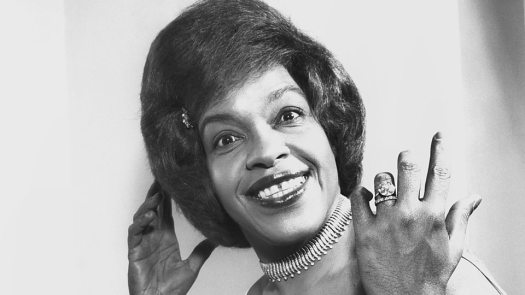Winifred Atwell – The Poor People of Paris (1956)

On 17 April, Chancellor of the Exchequer (and future Prime Minister) Harold Macmillan announced in his Budget speech the launch of Premium Bonds, to go on sale on 1 November, with £1,000 prize available in the first draw, taking place in June 1957. Three days later, jazz maestro (and eventual presenter of Radio 4’s comedy panel game I’m Sorry I Haven’t a Clue) Humphrey Lyttelton and his band record Bad Penny Blues with then little-known sound engineer Joe Meek. It became the first British jazz record to get into the top 20.
Meanwhile, The Dream Weavers’ It’s Almost Tomorrow was knocked off the number one spot for the second and final time, and Trinidadian pianist Winifred Atwell scored her second and last number one with her cover of The Poor People of Paris. Her fast-paced piano-playing and charming personality had seen her at number one during Christmas 1954 with Let’s Have Another Party, and this track was more of the same. Why change a winning formula though?
La goualante du pauvre Jean, as the song was called in France, translates into The Ballad of Poor John in English. Marguerite Monnot, one of Edith Piath’s top songwriters, had written the original music, with words by René Rouzaud. However, US songwriter Jack Lawrence wrote the English lyrics, and misinterpreted the French title, which is why the two differ so much. None of this really matters here though, as Atwell’s cover was instrumental.
Atwell, as usual, plays the song as if her life depends on it. It’s so frenetic, I accidentally pressed play on two separate clips at once and felt a nervous breakdown coming on. While this style of playing is considerably dated now, it still has a certain charm, and anything with a bit of life to it impresses in these early days of the chart. The main reason it appeals to me, however, is because I immediately recognised it as having featured in 90s Channel 4 comedy show Vic Reeves Big Night Out, a show that changed my life (no exaggeration). In the show, Bob Mortimer’s character Man with the Stick sings a slowed-down version, all about his ill-fated works holiday with ‘good-laugh’ Terry. Here it is in all its glory.
Atwell’s career continued to skyrocket. She had her own television series and performed to millions. She was loved by the Queen, who even requested she perform at a private party to keep spirits up during the Suez Crisis. Sadly, her race was an issue in the Deep South, which meant she never repeated her success in the US. An insightful, intelligent woman, she never complained about racism affecting her own life, considering herself lucky to be so well-loved, but frequently spoke out against it after moving to Australia. She died in 1983 of a heart attack, but her piano skills had an unlikely impact on the world of progressive rock, with both Keith Emerson and Rick Wakeman citing her as an influence.
